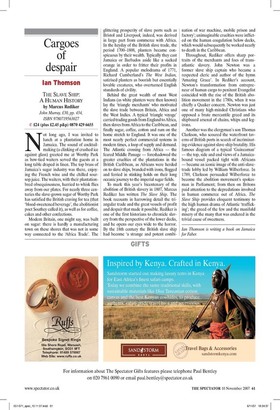Cargoes of despair
Ian Thomson THE SLAVE SHIP: A HUMAN HISTORY by Marcus Rediker John Murray, £30, pp. 434, ISBN 9780719563027 © £24 (plus £2.45 p&p) 0870 429 6655 Not long ago, I was invited to lunch at a plantation home in Jamaica. The sound of cocktailmaking (a clinking of crushed ice against glass) greeted me at Worthy Park as bow-tied waiters served the guests at a long table draped in linen. The top brass of Jamaica's sugar industry was there, enjoying the French wine and the chilled soursop juice. The waiters, with their plantationbred obsequiousness, hurried to whisk flies away from our plates. For nearly three centuries the slave-grown sugar of Worthy Park has satisfied the British craving for tea (that 'blood-sweetened beverage', the abolitionist poet Southey called it), as well as for coffee, cakes and other confections.
Modern Britain, one might say, was built on sugar: there is hardly a manufacturing town on these shores that was not in some way connected to the 'Africa Trade'. The glittering prosperity of slave ports such as Bristol and Liverpool, indeed, was derived in large part from commerce with Africa. In the heyday of the British slave trade, the period 1700-1808, planters became conspicuous by their wealth. Typically they cast Jamaica or Barbados aside like a sucked orange in order to fritter their profits in England. A popular melodrama of 1771, Richard Cumberland's The West Indian, satirised planters as boorish but essentially lovable creatures, who overturned English standards of civility.
Behind the great wealth of most West Indians (as white planters were then known) lay the 'triangle merchants' who motivated the slave trade between Britain, Africa and the West Indies. A typical 'triangle voyage' carried trading goods from England to Africa, then slaves from Africa to the Caribbean, and finally sugar, coffee, cotton and rum on the home stretch to England. It was one of the most nearly perfect commercial systems in modern times, a loop of supply and demand. The Atlantic crossing from Africa — the feared Middle Passage — foreshadowed the greater cruelties of the plantations in the British Caribbean, as Africans were herded on to slave ships, branded with irons, flogged and ferried in stinking holds on their long oceanic journey to the imperial sugar fields.
To mark this year's bicentenary of the abolition of British slavery in 1807, Marcus Rediker has written The Slave ship. The book recounts in harrowing detail the triangular trade and the great vessels of profit and despair that made it possible. Rediker is one of the first historians to chronicle slavery from the perspective of the lower decks, and he opens our eyes wide to the horror. By the 18th century the British slave ship had become 'a strange and potent combination of war machine, mobile prison and factory'; unimaginable cruelties were inflicted on the human coagulation below decks, which would subsequently be worked nearly to death in the Caribbean.
Throughout, Rediker offers sharp portraits of the merchants and foes of transatlantic slavery. John Newton was a former slave ship captain who became a respected cleric and author of the hymn 'Amazing Grace'. In Rediker's account, Newton's transformation from entrepreneur of human cargo to penitent Evangelist coincided with the rise of the British abolition movement in the 1780s, when it was chiefly a Quaker concern. Newton was just one of many high-minded Christians who opposed a brute mercantile greed and its shipboard arsenal of chains, whips and legirons.
Another was the clergyman's son Thomas Clarkson, who scoured the waterfront taverns of British ports in search of incriminating evidence against slave-ship brutality. His famous diagram of a typical `Guineaman' — the top, side and end views of a Jamaicabound vessel packed tight with Africans — became an iconic image of the anti-slavetrade lobby led by William Wilberforce. In 1789, Clarkson persuaded Wilberforce to become the abolition movement's spokesman in Parliament; from then on Britons paid attention to the depredations involved in human commerce out of Africa. The Slave ship provides eloquent testimony to the high human drama of Atlantic 'trafficking'; the greed of the few and the manifold misery of the many that was endured in the trivial cause of sweetness.
Ian Thomson is writing a book on Jamaica for Faber.





































































 Previous page
Previous page